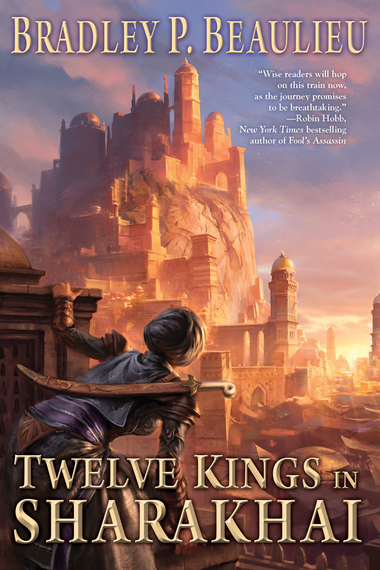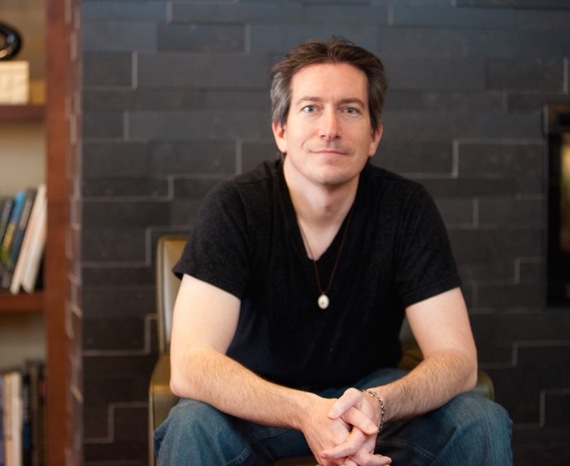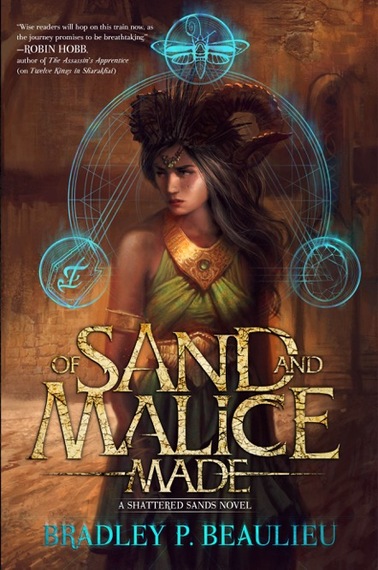Set in a Middle East-inspired world, Bradley Beaulieu's new epic fantasy series immerses the reader in an exquisitely detailed setting rife with fierce battles and dangerous magic. At the center of this epic is Çeda, a champion fighter with a secret past and ambitions to change an empire. The series therefore offers the best of epic fantasy--rich worldbuilding and an intriguing protagonist.
The series kicked off with Twelve Kings in Sharakhai, but now readers have the opportunity to delve into Çeda's past with a new prequel novel, Of Sand and Malice Made. (Beaulieu has also launched a Kickstarter offering swag from the series.) I caught up with Bradley about his inspiration for the series, his writing influences, and more.
You've chosen to set your fantasy in an Arabian Nights-style world, very different from the European settings so common in epic fantasy. Can you talk about this choice and what drew you to this setting?
I'd long wanted to scratch the itch to write a desert story. I can attribute this partly to liking the tales of the Arabian Nights (or One Thousand and One Nights), particularly the milieu. In fact, as my last series, The Lays of Anuskaya, progresses, you can see more and more of the Persian-influenced Aramahn coming into the picture, culminating in long stretches of desert scenes in the final book, The Flames of Shadam Khoreh.
So the desert was something I really wanted to explore, and I knew I wanted to steep the history of the city in a nomadic, Bedouin-like culture, but I'd probably (letting my geek flag fly here a bit) give the most credit to the Thieves' World anthologies for the inspiration for the setting. I loved the city of Sanctuary when I first starting reading the anthologies way (way!) back in high school. I loved that it was the "armpit of the empire," that it was a meeting point of old and new as the Rankan Empire drove into Ilsigi territory, that there were pantheons of gods vying for power, and in fact commingling even as they fought. Above all, I loved the vastness of Sanctuary and the hidden wonders it contained.
The feel of that is what I wanted to explore with Sharakhai. Sharakhai is in some ways a mere city state. But in effect it controls trade throughout a massive desert bordered by four powerful kingdoms, and because it controls trade, it has amassed incredible wealth and power. It hasn't done so without making enemies along the way, however. The twelve immortal kings of Sharakhai are hated by many. And the roots of the story are buried deeply in that hatred.
Who were some of the influences for your writing and for the new series?
I've mentioned quite a few writers along the way, beautiful and powerful writers like Celia Friedman, Robin Hobb, Guy Gavriel Kay, Tad Williams, Stephen R. Donaldson, and George R.R. Martin as general influences on my writing. But I'd like to focus on one writer who had a very direct effect on this series.
A few years ago I was sitting on a panel with Scott Lynch, a writer I've really come to admire, and he was talking about how a few different series--from Lois McMaster Bujold and Steven Brust, if I'm remembering correctly--looked at different aspects of a world in each of the books in a series. In other words: the books in the series were not simply one long arc broken up artificially by book covers, but rather, different prisms through which the world was viewed. Scott said he'd adopted that same approach for his Gentlemen Bastards series (a series I highly recommend, by the way). In the first book, he has a major heist, a la Oceans Eleven, in the second book it's piracy on the high seas, the third book is about cheating in politics, the fourth book is about espionage and war, and so on.
That approach really spoke to me, so I've been using it as the series has progressed. The second book has yet to come out, so I'll try not to be too spoilery, but suffice it to say that in the first book, Twelve Kings in Sharakhai, I'm trying to show the heart of the city of Sharakhai, what it's like now and why someone like Çeda would want to bring the Kings down. In the second book, we'll see more about the Kings and the Blade Maidens who protect them. In the third book, we'll head deep into the desert and learn more about the desert tribes who gave birth to Sharakhai. And so on.
I have rough plans for each book at this point. It has yet to be seen if the plan survives contact with the enemy!

In an age of epic fantasy series with huge casts of characters, The Song of Shattered Sands series is unusual in its intense focus on Çeda, the main character. What are the advantages and challenges of this focus on one central character?
It's interesting how this came about. I started the series with the express goal of telling an epic tale from a single point of view. In fact, the first draft of Twelve Kings in Sharakhai was told only from Çeda's point of view (including some of the flashbacks of Çeda as a girl raising herself on the streets). In reading it after, it became clear that the scope wasn't broad enough. The tale was too large to tell from only her point of view.
I felt I had to add more points of view, but I still wanted to keep the focus heavily on Çeda. That's exactly what I did, and I really like how it turned out. I like that we get some of the traits of a single-POV tale while still keeping the story broad enough to satisfy that epic itch I can't seem to escape.
The primary advantage for me is that it's clear this is Çeda's tale. She is undoubtedly the hero of the series. The question is: what hell is she going to have to go through to reach the end?
It does become a bit challenging in terms of where to draw the line in the balance of the various POV characters and threads I have going on. It's not something I worry overly much about during the first draft, but I do focus heavily on it in subsequent drafts, making sure I'm adding the right amounts of each ingredient. This is one of the subtler arts of writing in general, but certainly for epic tales with multiple POVs. As with everything, you get better at it over time. Perhaps by the time I've written the last novel I'll have it just about right!
You have a penchant for unusual settings in fantasy--your previous series, The Lays of Anuskaya, was inspired by Russia, which I've never seen done before in epic fantasy. What do you think you bring to the genre via these unusual settings, that might have been missing before?
I think that old writing chestnut is true: that all the stories have already been told. It's a paradoxical statement, of course--we keep coming out with more books, after all!--but the heart of it is accurate. There are only so many types of stories we can tell. But the beatiful thing is the magic isn't in the basic bones of the storytelling, but in the execution, in our particular take on it.
Just look at Harry Potter and The Name of the Wind. Broken down to their most basic elements, those two books aren't all that different from one another: two orphans go off to learn magic at a school after the loss of their parents, tragic events that continue to haunt both them and the tale oveall. But wow, what different books they are!
That's why I really love spending time on figuring out my particular take on a world, on the societies within it, on the ways people travel and communicate and trade. That's the stuff that gives me juice when I read, and it's absolutely one of the main drivers for me as a writer.
So my hope was to satisfy my urge to write these big, epic tales while putting a new spin on them. And the only way I really know how to do that is to sift through my inspirations and to cast my mind into the world of pure imagination (RIP Gene Wilder) and see where the intersection of those two experiences lands me.
In the case of The Lays of Anuskaya, I felt like western Medieval Europe had been done to death, and I wanted to explore a new place and weird it up a bit without going too far afield. Similar urges drove me in The Song of the Shattered Sands: finding something familiar yet distinctly new, something very much my own.
As for what I bring? Who the hell knows? I'll let other people debate that. I just hope people feel like they've been swept away and that they've had a unique experience after reading one of my books.
These books are rich with mythology and detail. All five senses are engaged by the descriptions, and the magic is multi-layered. What process did you go through in the construction of this rich world? Was there research involved?
I had done a fair bit of research into ancient Persia for The Lays of Anuskaya. Things like their clothing, artwork, cuisine, weaponry and armor, their approach to war. I carried a lot of that over to Twelve Kings in Sharakhai, but I hadn't really looked deeply into nomadic culture. The tribes of the Shangazi Desert are nomadic, sailing or occasionally riding from place to place around the desert, visiting traditional locations for hunting, for gathering needed supplies like water, food, and wood, and for gathering with the other tribes for holy days and to trade stories, to marry off daughters and sons, and so on. I looked more carefully into Bedouin culture for this, trying to steep myself in their food, clothing, artwork, tattoos, dances, and more.
One of the things I've really enjoyed doing is keeping a Pinterest board for inspiration. This can be found here:
https://www.pinterest.com/bradbeaulieu/twelve-kings-in-sharakhai/
It's great to have one place to save the images that sparked something in me when I first saw them. It's been an endless source of inspiration for me as I wrote the first book and as I write the next books in the series.
I also have a playlist on iTunes that I've been using since the first pages of Twelve Kings were being written. There's a lot of doudouk music, which I really enjoy. Artists like Lévon Minassian, Yeghish Manoukian, and Armand Amar are on the list. I also have a great soundtrack from Bab' Aziz - The Prince That Contemplated His Soul. And one more favorite is called Marrakesh Chillout Lounge from various artists. It's very modern, but with a Middle Eastern flair to the songs.
The Song of Shattered Sands seems to be gearing up for a massive, multi-volume epic. Can you talk about your plans for the series?
The series is currently planned as six books. I mentioned above how each book looks at different aspects of the desert as the series progresses, but let me touch on one more thing here. Even though each book looks at this world from a slightly different angle, I am trying to keep one, consistent throughline throughout the entire series. And basically it boils down to examining our own identity and what it means to be part of a family, part of a culture, how that defines us, and how different cultures mix (or don't, as is sometimes the case).
Çeda's family was essentially hidden from her by her mother. And one of the things that starts to come clear to her in the first book and beyond is just where she came from and why it was her mother hid it all from her. It's a riddle with answers that only beget more riddles, and slowly it expands into a history with roots that extend to the very night the immortal Kings secured their place of power in the desert, the role the desert gods played, and indeed, what the gods motivations might have been.
It's been a lot of fun so far unraveling that particular knot, and I know I'm going to enjoy it through to the end of the series.
Bradley P. Beaulieu began writing his first fantasy novel in college, but in the way of these things, it was set aside as life intervened. As time went on, though, Brad realized that his love of writing and telling tales wasn't going to just slink quietly into the night. The drive to write came back full force in the early 2000s, at which point Brad dedicated himself to the craft, writing several novels and learning under the guidance of writers like Nancy Kress, Joe Haldeman, Tim Powers, Holly Black, Michael Swanwick, Kij Johnson, and many more.
Brad's new novel, Twelve Kings in Sharakhai, was released to great acclaim in the fall of 2015, hitting over twenty "Best of 2015" book lists, including Amazon, Barnes & Noble, and BuzzFeed. Of Sand and Malice Made, a prequel novel to Twelve Kings in Sharakhai, was released in September of 2016.
*
Ilana Teitelbaum's writing has appeared in the Globe and Mail, the Los Angeles Review of Books, and Salon. Her epic fantasy debut, Last Song Before Night, was published in October 2015 by Tor/Macmillan under the pen name Ilana C. Myer.

